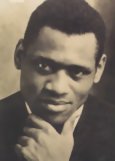
Paul Robeson
Paul Robeson was at his peak when these recordings were made in the 1940's. Up to this point, he had led a charmed life, awarded and feted by all. Then slowly, surely his fame and standing were eroded, and he eventually found himself an outcast in his own land.
Born in 1898, the son of a former slave, Robeson rose from a life of poverty to fame and fortune through his own acheivements. Valedictorian of his high school, he went to Rutgers University, was an All-American football player for two seasons, and broke records in baseball and track and field. He went on to study Law at Columbia, graduating in 1923 but practiced law for less than a year because his firm doubted juries would give a black lawyer much credence.
The stage was calling. He quickly found work in the movies, appearing in eleven feature films, including Gershwin's
Porgy and Bess and Eugene O'Neill's play
All God's Chillun Got Wings. He brought a new dignity and quiet anger to the title role in Shakespeares
Othello,
Variety Magazine describing his performance as “of such a stature that no white man should ever dare to presume to play it again”.
But it is for his singing that he became best-known. Robeson was blessed with a rich, deep bass-baritone voice, unlike any other, that became known around the world. His early concerts established the Negro Spiritual as an accepted art form on the American concert stage.
This CD recreates a typical Robeson recital, including all aspects of his characteristic repertoire. Traditional folk songs, both American and foreign, spirituals, classical compositions and popular show tunes make for an eclectic mix.
He is best-known for
Ol' Man River from Showboat. Jerome Kern wrote the piece for Robeson and it became his signature tune. In fact Robeson transformed it from a slave lament into a song of black resistance. Oscar Hammerstein's original lyrics read
“I gits weary and sick of tryin', I'm tired of livin' and feared of dyin” but Robeson changed it to
“I keeps laughin' instead of cryin', I must keep fightin' until I'm dyin”.
Gershwin's
Porgy and Bess, the first opera to ever deal with African Americans in a serious light, was also a Robeson standard. This CD includes
It Ain't Necessarily So from that opera as well as more tunes from Showboat and other show tunes that made Robeson a star.
But the crux of the CD are the songs that make up the title “Songs of Free Men”. These are a group of political songs from Russia, Spain, Germany and America. The four Russian songs, including the Red Army favourite
Song of the Plains pay tribute to Russia's heroic defence against the Nazi invasion. It is said that Russian soldiers would listen to Robeson before going out onto the battlefield.
The Spanish contribution is
Four Insurgent Soldiers sung by Robeson during his visit to Spain during the Spanish Civil War, and
Peat Bog Soldiers was sung by prisoners in Nazi concentration camps, both reflecting Robeson's antifascist feelings.
The American songs “The Purest Kind of Guy” and “Joe Hill” describe the awakening social consciousness of people during the great depression.

Paul Robeson
Robeson was interested in music with a social message, and that message became increasingly obvious as socialist, if not downright communist. As well as singing these songs, Robeson used his fame to speak out about social issues. He travelled several times to Russia, where he was treated as a hero, and even awarded the Stalin Prize.
1950's America caught up with him of course. His concerts became picketed and protested, and there were riots. He was hauled in front of the McCarthy hearings, and his agents started deserting him. His magnificent voice became effectively silenced.
In the 1960's he bacame ill with Pagets disease, and despite a resurrection of his standing, he was no longer able to perform. He died in 1976. His gravestone bears the inscription:
The artist must elect to fight
for freedom or for slavery.
I have made my choice.
I have no alternative.
This is a handsome set in the Masterworks Heritage label. The cover recreates the original record label, the slipcase in the from of a miniature record sleeve. The transfers are nothing short of remarkable, remastered from the original shellacs.
Historical re-issues are an important part of modern CD pressings, bringing the past, both sound and history, back to life. It does not matter whether you agree or disagree with Robeson's political views; his gagging by society was unjustified. This CD goes some way to rectify the fault. Or ignore the politics and just listen to that incredible voice.
Please support Good-Music-Guide.com
by purchasing this CD using this link.

Track Listing
Paul Robeson
Songs of Free Men
Lawrence Brown, piano (tracks 1-17)
Columbia Concert Orchestra
(tracks 18-25)
- Balm in Gilead - Traditional
- Chassidic Chant - Engel
- Quiet Flows The Don: From Border To Border - Dzerzhinsky
- Quiet Flows The Don: Oh, How Proud Our Quiet Don - Dzerzhinsky
- Elijah, Op. 70: The Lord God Of Abraham - Mendelssohn
- The Purest Kind Of Guy (Joe's Birthday Song) Blitzstein
- Joe Hill - Hayes/Robinson
- The Peat-Bog Soldiers - from a NAZI concentration camp
- The Four Insurgent Generals - Traditional
- Native Land - Donayevsky
- Song Of The Plains
- Cradle Song - Gretchaninoff
- Within Four Walls - Mussorgsky
- By An' By
- Sometimes I Feel Like A Motherless Child - Traditional
- John Henry - Traditional
- Water Boy - Robinson
- My Curly Headed Baby - Clutsam
- Mah Lindy Lou - Strickland
- Wagon Wheels - DeRose/Hill
- The House I Live In - Lewis/Robinson
- Showboat: I Still Suits Me - Hammerstein/Kern
- Sylvia - Scollard/Speaks
- Showboat: Ol' Man River - Hammerstein/Kern
- Porgy And Bess: It Ain't Necessarily So - Gershwin